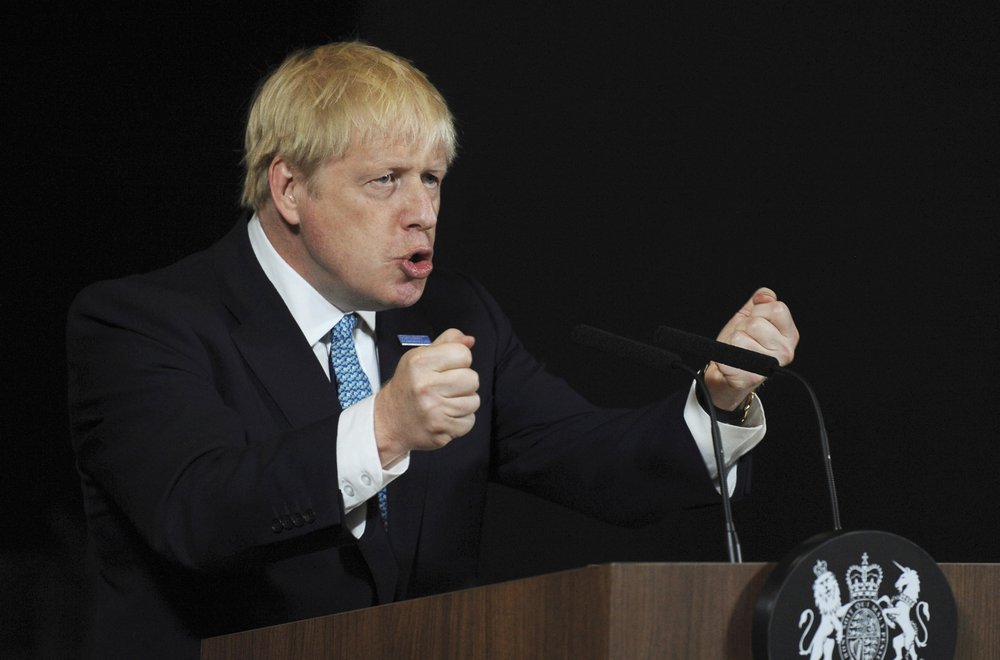
Britain's Prime Minister Boris Johnson talks during a speech on domestic priorities at the Science and Industry Museum in Manchester, England, July 27, 2019. Johnson is gambling his future on the audacious proposition that he can blunt an effort to halt his Brexit plan by simply suspending “the mother of all parliaments” for key weeks ahead of the October 31 departure date. (Photo: AP)
British Prime Minister Boris Johnson is gambling his future on the audacious proposition that he can blunt an effort to halt his Brexit plan by simply suspending “the mother of all parliaments” for key weeks ahead of the October 31 departure date.
If Parliament isn’t in session, it can’t conduct official business and won’t be able to take concerted action to prevent him from pushing through a “no-deal” Brexit that would abruptly sever ties between Britain and the European Union if he is unable to reach a new deal by that date.
Johnson knew full well that asking Queen Elizabeth II to suspend Parliament would provoke howls that he is masterminding an anti-democratic coup. But if he is able to make good on his frequent vow to leave the EU on Oct. 31, Johnson stands to be remembered as the leader who made the results of the 2016 Brexit referendum a reality.
“If it works, many will say that it was a brilliant piece of political theater and leadership,” said Anthony Seldon, a historian at the University of Buckingham. “And if it doesn’t, it will quite possibly spell the end of his premiership.”
Johnson is betting that the political boost would overshadow any financial costs, despite dire warnings from influential business leaders and economists that a sudden break of European ties would plunge Britain into a prolonged recession accompanied by a loss of jobs and consumer buying power.
It is a step that his predecessor, former Prime Minister Theresa May, was unwilling to take. She repeatedly pulled back from the brink and sought an extension from the other 27 EU nations rather than depart without a deal on future economic arrangements.
But if the gamble fails, Johnson may well face a general election that would put his Conservative Party’s leadership at risk, or find his Brexit bid blocked by an energized Parliament determined to impose its will in what has become a historic political clash.
Even if that happens, Seldon said, Johnson could be well positioned for a general election because he could blame Parliament for thwarting the will of the people by making Brexit impossible despite the majority that backed it in the referendum.
The prime minister’s decision drew predictable condemnation from some British newspapers that are vehemently opposed to a no-deal departure. The Independent said Johnson is using “devious” means to undermine Britain’s democratic institutions.
“With just 63 days until the 31 October deadline, an unelected prime minister has made himself unaccountable to MPs for five weeks,” it said. “Not only does Boris Johnson want to deny voters the Final Say, he is now silencing their representatives.”
Johnson has very little leeway for any political slippage. He was not elected in his own right and his party does not enjoy a majority in the House of Commons, relying instead on an agreement with a small Northern Ireland party to back it on key votes.
Both of his predecessors — May and David Cameron — were brought down by Brexit setbacks, and Johnson seems determined to avoid their fate. By suspending Parliament for much of the period before the departure date, he is reducing the time available for his political opponents to come up with a solid legislative plan to block a no-deal Brexit.
Scott Ainslie, an English member of the European Parliament with the Green Party, said Johnson’s provocative tactic may serve to galvanize the opposition to quickly come up with an effective way to prevent a no-deal Brexit.
“All the other parties must now organize at this pivotal moment of history and unite to stop this car crash of a government,” he said, characterizing the suspension of Parliament as a “last-chance saloon” gambit that may represent the hobbled Conservative Party’s “death rattle.”
The next general election is scheduled for 2022, but it could be moved up if Johnson loses a no-confidence vote in Parliament or decides to call an early election with the goal of winning an outright majority.


